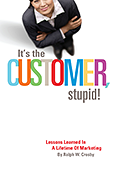“Big Data” Predicts The Future
A new phrase has crept into the marketing lexicon — “Big Data.” At a recent University of Maryland conference on big data, amid talk of algorithms and terabytes of data, etc., were some important marketing lessons.
The first is: you have a right to fear this overwhelming information overload. As written in USA Today, by Chuck Raasch:
“Welcome to your everyday world of ‘Big Data,’ the infinite sea of facts, products, books, maps, conversations, references, opinions, trends, videos, advertisements, surveys — all of the sense and nonsense that is literally at your fingertips, 24/7, everyday from now on. Eric Schmidt, Google’s executive chairman, estimates that humans now create in two days the same amount of data that it took from the dawn of civilization until 2003 to create.”
Big data also is fearsome because it requires special analytical skills. Marketers need sophisticated professionals to measure, analyze and utilize the data. In other words, it takes an analytics pro to meaningfully crunch the numbers and find real meaning and marketing insights.
Despite these fears, you can’t and shouldn’t avoid the use of big data. As explained by the McKinsey Global Institute in its paper “Big data: the next frontier for innovation, competition, and productivity:”
“Digital data is now everywhere — in every sector, in every economy, in every organization and user of digital technology. While this topic might once have concerned only a few data geeks, big data is now relevant for leaders across every sector, and consumers of products and services stand to benefit from its application. The ability to store, aggregate, and combine data and then use the results to perform deep analyses has become ever more accessible…”
The McKinsey researchers added: “Further, the ability to generate, communicate, share, and access data has been revolutionized by the increasing number of people, devices, and sensors that are now connected by digital networks.”
So, with the right devices, if you get the right numbers crunched by the right people, the results can be awesome.
I wish I had the space to fully recount some of the examples from the University of Maryland conference. These examples showed how big data analysis altered preconceived notions and impacted decision-making. In one case, data collected by following premature babies over time entirely changed the way infections in preemies were treated, saving lives.
Such examples of big data usage are on the rise in business. For example, Hollywood studios are analyzing social media data to understand how consumers view a certain movie to help the studios make marketing and distribution decisions. Another example: Using advanced analytics solutions to analyze hundreds of thousands of customer surveys, a car rental company significantly reduced delays during auto returns at certain times of the day, increasing productivity and keeping customers.
In all cases, the data measured human interaction with a product, service or organization, producing a marketing gold mine. Just the job title of the University of Maryland conference’s moderator, Google’s Dan Russell, gives you an idea of big data’s impact on marketing to consumers. He is Google’s “director of user happiness.”
There’s nothing new about tracking and analyzing customer interaction with your marketing efforts over time to produce valuable information. But big data allows you to take this marketing research to new heights. The more data on customers we have, the easier it becomes to predict their behavior… and maximize your future marketing results.
###

 Businesses often are started by entrepreneurs with an idea, a product or service, or an expertise. Many of them fail, not because the idea or product isn’t good, but because their attention is overwhelmingly directed internally – e.g., what goes into the product – when they should focus externally, always reminding themselves:
Businesses often are started by entrepreneurs with an idea, a product or service, or an expertise. Many of them fail, not because the idea or product isn’t good, but because their attention is overwhelmingly directed internally – e.g., what goes into the product – when they should focus externally, always reminding themselves:

I love that quote from Eric Schmidt, whose Father i believe was a professor at UM. Your staff has seen how our print company purchased a new high powered digital press to tackle “big data” and crunch it into direct mail targeted messaging. Granular analysis is no longer for just online Geeks – it can be used by anyone to forge ahead in the direct mail marketing world.